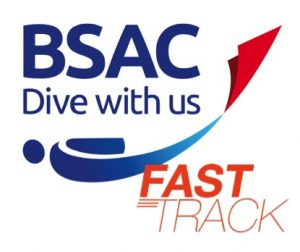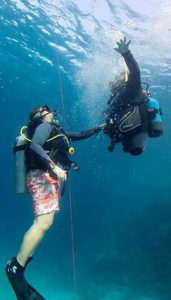 Divecrew are a BSAC Fast Track Centre with an area covering the South East of England. So what is BSAC Fast Track? Divecrew have crossed instructors over to BSAC. So it means any club in the South East of England can refer a diver to Divecrew. Divecrew takes that student diver and progresses them through their chosen course, for example Ocean Diver. As Divecrew trains every week and has full time paid instructors the course goes ahead on agree dates regardless. Working on Fast Track the student could finish the theory and confined on two consecutive weekends. The open water element then being completed in one weekend. So three weeks, qualified. This removes the months of training within the club itself.
Divecrew are a BSAC Fast Track Centre with an area covering the South East of England. So what is BSAC Fast Track? Divecrew have crossed instructors over to BSAC. So it means any club in the South East of England can refer a diver to Divecrew. Divecrew takes that student diver and progresses them through their chosen course, for example Ocean Diver. As Divecrew trains every week and has full time paid instructors the course goes ahead on agree dates regardless. Working on Fast Track the student could finish the theory and confined on two consecutive weekends. The open water element then being completed in one weekend. So three weeks, qualified. This removes the months of training within the club itself.
Once the diver is certified, Divecrew puts the diver back with the club. They then can go an dive, rather than being in training for months. This takes pressure of the BSAC Club Instructors. However, the Fast Track divers are going to need to gain experience. They are raw new divers. Certainly to be signed off, their buoyancy will be acceptable as will their mastery of the skills.
Divecrew have committed to the BSAC Fast Track programme and will deliver divers back to the respective clubs. Divecrew instructors are in the water every weekend teaching. However, Fast Track is not for everyone. Some students need a slower pace of learning and mastering skills. In which case they need to be trained by their club.
The Fast Track programme is in its infancy. However, Divecrew already have circa 20 students wanting fast Track.
A major coup was the Imperial College London who want Divecrew to Fast Track a group of Ocean Divers and Sport Divers.
So what about the PADI versus BSAC stand off? Well our Director of Instruction is a Master Instructor of three different agencies and an Instructor of BSAC. Add to this being an Instructor Trainer for Adaptive Teaching, Martin has a powerful set of tools available to him.
Martin stated, ‘Every agency thinks they have it right and everyone else is wrong and therefore inferior. I have met good PADI divers and really poor PADI divers. Ditto SSI, ditto RAID, ditto BSAC. No one agency has it right 100%. Being mutli-agency I steal great techniques from each agency, add adaptive teaching where needed and make the techniques my own. This truly benefits the student on any course I run. As an instructor, I sometimes cannot get my head around the sheer arrogance of pompous instructors who know it all and know best. I would love to make it mandatory for every instructor to teach up to 16 school children and teach a triple amputee. No agency in its IDC makes enough effort about thinking outside the box. A number of the main agencies are too focused on liability and standards that must be met. Example. We work with veterans, troops who have suffered life changing injuries. A social media picture of a diver with no legs completing a course (open water) was met with some idiot instructor stating he should not be qualified as he cannot perform a giant stride. Unbelievable? I have come across this a number of times. Not just with a diver with no legs. I had it once with an autistic group where the diver refused to do a giant stride. She opted for a roll in to deep water. Job done. Check the standards! Divecrew are constantly developing its pro team and challenge agency standards as to their validity and interpretation. Divecrew will always be a high profile industry leader, not a follower. We are really pleased to be approached to be the South East BSAC Fast Track Centre. We are looking forward to breaking the past divides of PADI v BSAC. In Divecrew’s eyes – a diver is a diver regardless of the training agency’.
If you are interested in becoming a BSAC Fast Track Diver contact Divecrew. If you would like to become a Partner Club to Divecrew Fast Track Centre contact Divecrew.

 At Divecrew we try not to teach divers as a homogenous group. Everyone is different. So how did we get to the this point? Well first thing is we challenge some agencies as they tend to turn our “sheep” instructors. Instructors being professional should use a range of skills and techniques so that every diver student can be taught in comfort and safety. Working with Deptherapy and injured troops heightened our senses to the individual needs of the divers. The “sheep” mentality is challenged as to what is a technique and what is a standard. For example many instructors talk of a giant stride as a deep water entry. So what is the best entry for a student? The easiest! Simple. The standards state a deep water entry not a giant stride.
At Divecrew we try not to teach divers as a homogenous group. Everyone is different. So how did we get to the this point? Well first thing is we challenge some agencies as they tend to turn our “sheep” instructors. Instructors being professional should use a range of skills and techniques so that every diver student can be taught in comfort and safety. Working with Deptherapy and injured troops heightened our senses to the individual needs of the divers. The “sheep” mentality is challenged as to what is a technique and what is a standard. For example many instructors talk of a giant stride as a deep water entry. So what is the best entry for a student? The easiest! Simple. The standards state a deep water entry not a giant stride. students often have the masks just too tight, making the skill difficult if removing a mask and then replacing it. They struggle to replace the strap over their head, pull the mask to their face in an attempt to do so, forcing water up the nose. Divers with long hair find the silicon strap grabs the hair. Simple solution is a slap band.
students often have the masks just too tight, making the skill difficult if removing a mask and then replacing it. They struggle to replace the strap over their head, pull the mask to their face in an attempt to do so, forcing water up the nose. Divers with long hair find the silicon strap grabs the hair. Simple solution is a slap band.